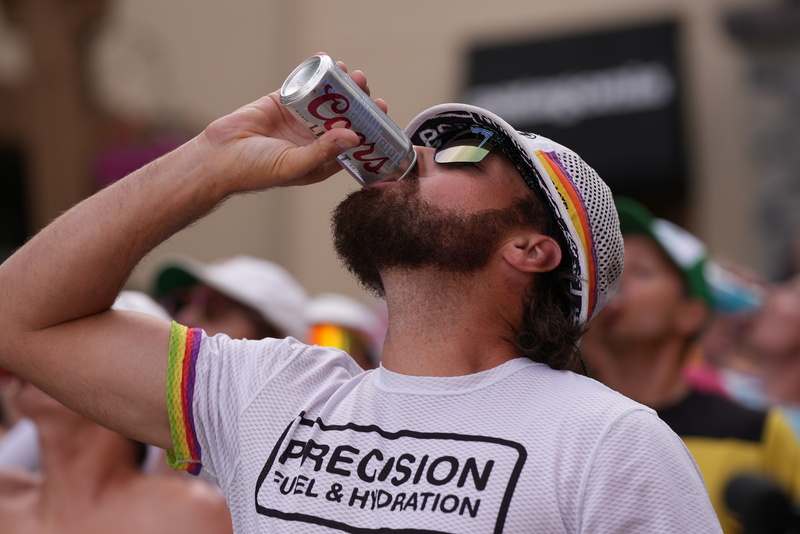Alcohol is synonymous with celebrations. There's a clearly defined alcohol culture among team and individual athletes that follows the logic of 'the work is done, now the celebration begins'! Enter post-race beers, champagne sprays, fruity cocktails following tropical destination races... the list goes on and on.
Some races even provide beers during races and at the finish line. Sharing a drink together is viewed by many as social bonding, a way to relax and unwind while enjoying reflection on the day’s big accomplishments.
Before you hurriedly close this window, know that is not an article persuading you to cut out all alcohol. Rather, it’s a deep dive into three of the big ways (there are more!) alcohol impacts endurance athletes, so that you're armed with the knowledge to make the best decision for you...
1. Recovery
One of the biggest considerations/variables when it comes to alcohol consumption is the amount being consumed. For this article, let’s assume low-to-moderate consumption (1-3 drinks at a time).
Recovery after a big training session or race is one of the pillars of endurance training. The body must replenish depleted carbohydrate, glycogen and protein stores to prepare for the next big effort.
When athletes don’t give their bodies the nutrients it needs to recover well, injuries, illness and a myriad of other side effects become a viable possibility.
Specifically, consuming 20-25 grams of protein shortly after exercise and repeating every four hours has been shown to maximise your protein replenishment in skeletal muscle.
So, how does alcohol impact your recovery?
A study by Parr et al looked at a group of physically active males doing a single session of concurrent training (CT), which is a combination of resistance and endurance training. The purpose of the study was to determine alcohol’s effect on anabolic cell signalling and rates of myofibrillar protein synthesis (MPS).
They concluded that alcohol consumption reduced rates of MPS following the workout, even when consumed with protein. Therefore, it was assumed that alcohol suppresses the anabolic response in skeletal muscle, leading to impaired recovery and adaptation to training and/or performance.
Barnes (2014) found that 0.5 g/kg alcohol consumed post-race was unlikely to impact recovery. Using the example of a 57 kg (125-pound) athlete, this equates to approximately one standard drink.

2. Hydration
Most people know that 60% of the human body is comprised of water and that maintaining adequate fluid levels is very important. For endurance athletes, maintaining optimal hydration status is essential for peak performance.
Alcohol is a diuretic, which means it creates an increased output of urine, often leading to dehydration and electrolyte imbalance. Even a small amount of alcohol can throw off hydration levels.
Sodium is the most prevalent electrolyte lost in your sweat, so it’s imperative to keep sodium within range so your muscles can contract, your GI system can break down fuel, your fluid balance is spot on, your brain functions optimally and you recover properly.
An old but good study by Ylikahri et al (1974) suggested electrolyte changes play a minor role in the genesis of an alcohol hangover, which instead seemed to be caused more so by dehydration.
Evans stated that “the ingestion of alcohol-containing drinks after exercise should be avoided if rehydration is the primary goal”. In short, consuming alcohol after races can delay the return of normal hydration status.
And it's why PH 1500 electrolytes are considered to be a useful recovery tool for overcoming the dehydrating effects of alcohol (and the associated hangovers... or so I've heard!).
3. Nutritional deficiencies
Alcohol contains seven calories per gram of “empty” calories – no nutritional value. This compares to four calories per gram of carbohydrate/protein and nine calories per gram of fat. Depending on the type of alcohol you consume, sugar also factors in here when you're drinking fancy mixed drinks like Moscow Mules (dang, that ginger beer is soooo good though).
Drinking alcohol affects your energy metabolism, digestion and absorption of nutrients, which can lead to micronutrient deficiency and possible chronic disease development. This includes deficiencies in vitamin C, vitamin A and iron. Endurance athletes (especially females) are already at risk for iron deficiency.
Excessive alcohol intake can also reduce the intestine’s ability to absorb nutrients such as vitamin B12, thiamin and folate. The nutritional requirements for athletes are above and beyond the general population due to increased energy expenditure and performance demands placed on the body, so maintaining micronutrient levels is essential.
What does this all mean for you?
While this is far from a comprehensive list of the ways alcohol consumption can impact athletes (other examples include body composition, soft tissue injuries, immune function, glycogen resynthesis, etc.), it highlights three main considerations.
It's fun, social, and rewarding for many to celebrate the conclusion of a big workout or race with an adult beverage. But it’s important to first gain an understanding of what's happening behind the scenes.
Putting rehydration and refueling strategies in place BEFORE reaching for that post-race cocktail or beer can make a big difference to your body. After all, we spend a lot of time, money and energy in the pursuit of our athletic goals, and our bodies work hard to get us to the finish line.
